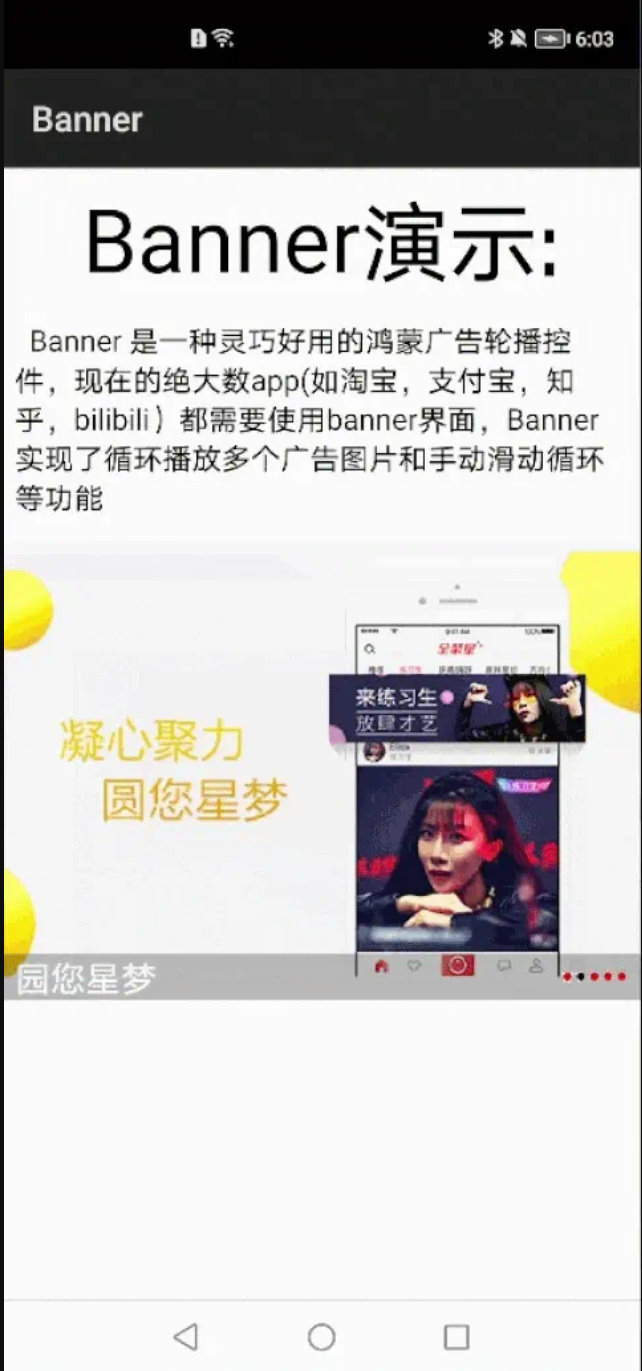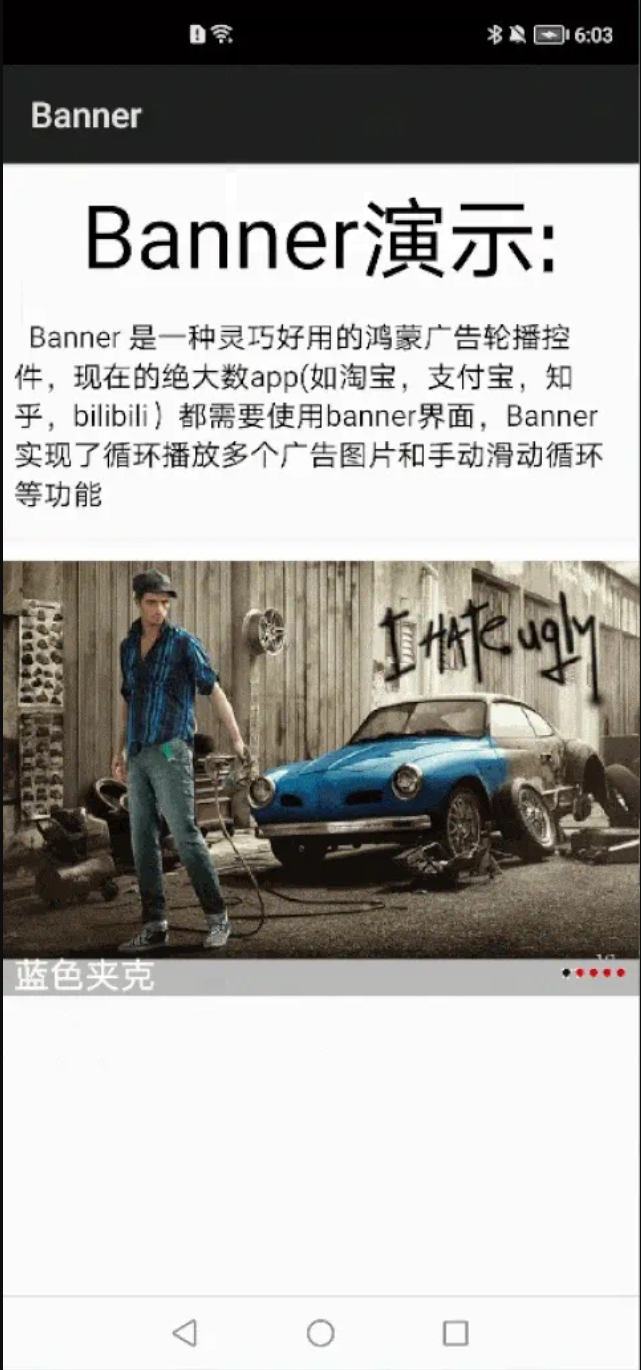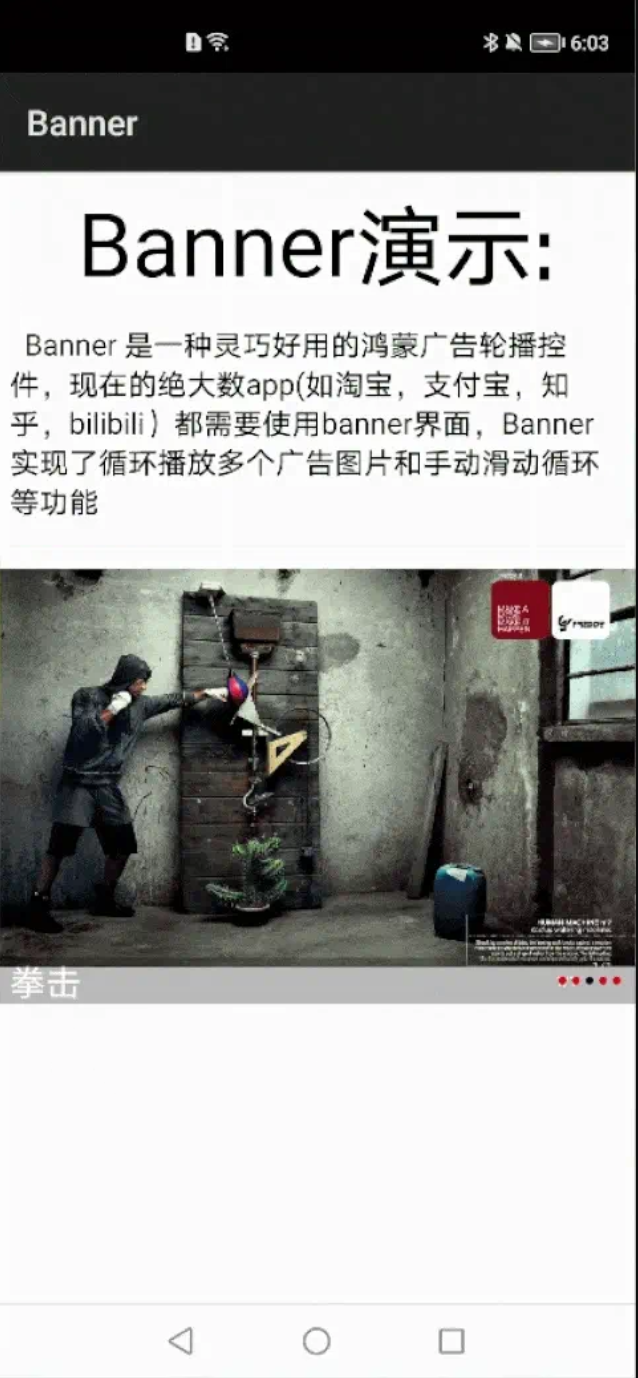我是中原工学院的学生,我的鸿蒙大作业如下
一.运行效果示意图



二.代码实现
1.主界面实现:
package com.huawei.mytestapp;
import com.huawei.mytestapp.slice.MainAbilitySlice;
import ohos.aafwk.ability.Ability;
import ohos.aafwk.content.Intent;
public class MainAbility extends Ability {
@Override
public void onStart(Intent intent) {
super.onStart(intent);
super.setMainRoute(MainAbilitySlice.class.getName());
}
}public class GlideImageLoader extends ImageLoader {
@Override
public void displayImage(Context context, Object path, Image imageView) {
Glide.with(context)
.load(path)
.placeholder(ResourceTable.Media_no_banner)
.diskCacheStrategy(DiskCacheStrategy.ALL)
.skipMemoryCache(true)
.into(imageView);
}
}
public abstract class ImageLoader implements ImageLoaderInterface<Image> {
public ImageLoader() {
}
public Image createImageView(Context context) {
Image imageView = new Image(context);
return imageView;
}
package com.youth.banner.loader;
import ohos.agp.components.Component;
import ohos.app.Context;
import java.io.Serializable;
public interface ImageLoaderInterface<T extends Component> extends Serializable {
void displayImage(Context context, Object path, T imageView);
T createImageView(Context context);
}
package com.youth.banner.listener;
/**
* 旧版接口,由于返回的下标是从1开始,下标越界而废弃(因为有人使用所以不能直接删除)
*/
@Deprecated
public interface OnBannerClickListener {
public void OnBannerClick(int position);
}
package com.youth.banner.listener;
public interface OnBannerListener {
public void OnBannerClick(int position);
}
package com.huawei.mytestapp;
import ohos.aafwk.ability.AbilityPackage;
public class MyApplication extends AbilityPackage {
@Override
public void onInitialize() {
super.onInitialize();
}
}2.创建横幅类
public class WeakHandler {
private final EventHandler mExec;
private Lock mLock = new ReentrantLock();
@SuppressWarnings("ConstantConditions")
final ChainedRef mRunnables = new ChainedRef(mLock, null);
public WeakHandler( EventRunner eventRunner) {
mExec = new EventHandler(eventRunner);
}
// /**
// * Use the provided {@link Looper} instead of the default one and take a callback
// * interface in which to handle messages.
// *
// * @param looper The looper, must not be null.
// * @param callback The callback interface in which to handle messages, or null.
// */
// public WeakHandler(@NonNull Looper looper, @NonNull Handler.Callback callback) {
// mCallback = callback;
// mExec = new ExecHandler(looper, new WeakReference<>(callback));
// }
/**
* Causes the Runnable r to be added to the message queue.
* The runnable will be run on the thread to which this handler is
* attached.
*
* @param r The Runnable that will be executed.
*
* @return Returns true if the Runnable was successfully placed in to the
* message queue. Returns false on failure, usually because the
* looper processing the message queue is exiting.
*/
public final void post( Runnable r) {
mExec.postTask(wrapRunnable(r));
}
public final void postAtTime(Runnable r, long uptimeMillis) {
mExec.postTimingTask(wrapRunnable(r), uptimeMillis);
}
public final void postAtTime(Runnable r, Object token, long uptimeMillis) {
mExec.postTimingTask(wrapRunnable(r), uptimeMillis, (EventHandler.Priority) token);
}
/**
* Causes the Runnable r to be added to the message queue, to be run
* after the specified amount of time elapses.
* The runnable will be run on the thread to which this handler
* is attached.
*
* @param r The Runnable that will be executed.
* @param delayMillis The delay (in milliseconds) until the Runnable
* will be executed.
*
* @return Returns true if the Runnable was successfully placed in to the
* message queue. Returns false on failure, usually because the
* looper processing the message queue is exiting. Note that a
* result of true does not mean the Runnable will be processed --
* if the looper is quit before the delivery time of the message
* occurs then the message will be dropped.
*/
public final void postDelayed(Runnable r, long delayMillis) {
mExec.postTask(wrapRunnable(r),delayMillis);
}
/**
* Posts a message to an object that implements Runnable.
* Causes the Runnable r to executed on the next iteration through the
* message queue. The runnable will be run on the thread to which this
* handler is attached.
* <b>This method is only for use in very special circumstances -- it
* can easily starve the message queue, cause ordering problems, or have
* other unexpected side-effects.</b>
*
* @param r The Runnable that will be executed.
*
* @return Returns true if the message was successfully placed in to the
* message queue. Returns false on failure, usually because the
* looper processing the message queue is exiting.
*/
public final void postAtFrontOfQueue(Runnable r) {
mExec.postTask(wrapRunnable(r));
}
/**
* Remove any pending posts of Runnable r that are in the message queue.
*/
public final void removeCallbacks(Runnable r) {
final WeakRunnable runnable = mRunnables.remove(r);
if (runnable != null) {
mExec.removeTask(runnable);
}
}
/**
* Remove any pending posts of Runnable <var>r</var> with Object
* <var>token</var> that are in the message queue. If <var>token</var> is null,
* all callbacks will be removed.
*/
public final void removeCallbacks(Runnable r, Object token) {
final WeakRunnable runnable = mRunnables.remove(r);
if (runnable != null) {
mExec.removeEvent(0,runnable);
}
}
/**
* Pushes a message onto the end of the message queue after all pending messages
* before the current time. It will be received in callback,
* in the thread attached to this handler.
*
* @return Returns true if the message was successfully placed in to the
* message queue. Returns false on failure, usually because the
* looper processing the message queue is exiting.
*/
public final void sendMessage(InnerEvent msg) {
mExec.sendEvent(msg);
}
/**
* Sends a Message containing only the what value.
*
* @return Returns true if the message was successfully placed in to the
* message queue. Returns false on failure, usually because the
* looper processing the message queue is exiting.
*/
public final void sendEmptyMessage(int what) {
mExec.sendEvent(what);
}
public final void sendEmptyMessageDelayed(int what, long delayMillis) {
mExec.sendEvent(what, delayMillis);
}
public final void sendEmptyMessageAtTime(int what, long uptimeMillis) {
mExec.sendTimingEvent(what, uptimeMillis);
}
/**
* Enqueue a message into the message queue after all pending messages
* before (current time + delayMillis). You will receive it in
* callback, in the thread attached to this handler.
*
* @return Returns true if the message was successfully placed in to the
* message queue. Returns false on failure, usually because the
* looper processing the message queue is exiting. Note that a
* result of true does not mean the message will be processed -- if
* the looper is quit before the delivery time of the message
* occurs then the message will be dropped.
*/
public final void sendMessageDelayed(InnerEvent msg, long delayMillis) {
mExec.sendEvent(msg, delayMillis);
}
public void sendMessageAtTime(InnerEvent msg, long uptimeMillis) {
mExec.sendTimingEvent(msg, uptimeMillis);
}
/**
* Enqueue a message at the front of the message queue, to be processed on
* the next iteration of the message loop. You will receive it in
* callback, in the thread attached to this handler.
* <b>This method is only for use in very special circumstances -- it
* can easily starve the message queue, cause ordering problems, or have
* other unexpected side-effects.</b>
*
* @return Returns true if the message was successfully placed in to the
* message queue. Returns false on failure, usually because the
* looper processing the message queue is exiting.
*/
public final void sendMessageAtFrontOfQueue(InnerEvent msg) {
mExec.sendEvent(msg);
}
/**
* Remove any pending posts of messages with code 'what' that are in the
* message queue.
*/
public final void removeMessages(int what) {
mExec.removeEvent(what);
}
/**
* Remove any pending posts of messages with code 'what' and whose obj is
* 'object' that are in the message queue. If <var>object</var> is null,
* all messages will be removed.
*/
public final void removeMessages(int what, Object object) {
mExec.removeEvent(what, object);
}
/**
* Remove any pending posts of callbacks and sent messages whose
* <var>obj</var> is <var>token</var>. If <var>token</var> is null,
* all callbacks and messages will be removed.
*/
public final void removeCallbacksAndMessages(Object token) {
mExec.removeAllEvent();
}
/**
* Check if there are any pending posts of messages with code 'what' in
* the message queue.
*/
public final boolean hasMessages(int what) {
return mExec.hasInnerEvent(what);
}
/**
* Check if there are any pending posts of messages with code 'what' and
* whose obj is 'object' in the message queue.
*/
public final boolean hasMessages(int what, Object object) {
return mExec.hasInnerEvent( object);
}
public final EventRunner geteventrunner() {
return mExec.getEventRunner();
}
private WeakRunnable wrapRunnable( Runnable r) {
//noinspection ConstantConditions
if (r == null) {
throw new NullPointerException("Runnable can't be null");
}
final ChainedRef hardRef = new ChainedRef(mLock, r);
mRunnables.insertAfter(hardRef);
return hardRef.wrapper;
}
// private static class ExecHandler extends EventHandler {
//// private final WeakReference<Handler.Callback> mCallback;
//
// ExecHandler() {
// mCallback = null;
// }
//
// ExecHandler(WeakReference<Handler.Callback> callback) {
// mCallback = callback;
// }
//
// ExecHandler(Looper looper) {
// super(looper);
// mCallback = null;
// }
//
// ExecHandler(Looper looper, WeakReference<Handler.Callback> callback) {
// super(looper);
// mCallback = callback;
// }
//
// public ExecHandler(EventRunner eventRunner) {
// }
//
// @Override
//// public void handleMessage(@NonNull Message msg) {
//// if (mCallback == null) {
//// return;
//// }
//// final Handler.Callback callback = mCallback.get();
//// if (callback == null) { // Already disposed
//// return;
//// }
//// callback.handleMessage(msg);
//// }
//// }
static class WeakRunnable implements Runnable {
private final WeakReference<Runnable> mDelegate;
private final WeakReference<ChainedRef> mReference;
WeakRunnable(WeakReference<Runnable> delegate, WeakReference<ChainedRef> reference) {
mDelegate = delegate;
mReference = reference;
}
@Override
public void run() {
final Runnable delegate = mDelegate.get();
final ChainedRef reference = mReference.get();
if (reference != null) {
reference.remove();
}
if (delegate != null) {
delegate.run();
}
}
}
static class ChainedRef {
ChainedRef next;
ChainedRef prev;
final Runnable runnable;
final WeakRunnable wrapper;
Lock lock;
public ChainedRef(Lock lock, Runnable r) {
this.runnable = r;
this.lock = lock;
this.wrapper = new WeakRunnable(new WeakReference<>(r), new WeakReference<>(this));
}
public WeakRunnable remove() {
lock.lock();
try {
if (prev != null) {
prev.next = next;
}
if (next != null) {
next.prev = prev;
}
prev = null;
next = null;
} finally {
lock.unlock();
}
return wrapper;
}
public void insertAfter( ChainedRef candidate) {
lock.lock();
try {
if (this.next != null) {
this.next.prev = candidate;
}
candidate.next = this.next;
this.next = candidate;
candidate.prev = this;
} finally {
lock.unlock();
}
}
public WeakRunnable remove(Runnable obj) {
lock.lock();
try {
ChainedRef curr = this.next; // Skipping head
while (curr != null) {
if (curr.runnable == obj) { // We do comparison exactly how Handler does inside
return curr.remove();
}
curr = curr.next;
}
} finally {
lock.unlock();
}
return null;
}
}三.使用方法
setBannerStyle(int bannerStyle) 设置轮播样式(默认为CIRCLE_INDICATOR,有五种样式可以选择,其中数字样式有点小bug待修复)
isAutoPlay(boolean isAutoPlay) 设置是否自动轮播(默认自动) setViewPagerIsScroll(boolean isScroll) 设置是否允许手动滑动轮播图(默认true) update(List<?> imageUrls,List titles) 更新图片和标题 update(List<?> imageUrls) 更新图片 startAutoPlay() 开始轮播 1.4开始,此方法只作用于banner加载完毕-->需要在start()后执行 stopAutoPlay() 结束轮播 1.4开始,此方法只作用于banner加载完毕-->需要在start()后执行 start() 开始进行banner渲染(必须放到最后执行) setBannerTitles(List titles) 设置轮播要显示的标题和图片对应(如果不传默认不显示标题) setDelayTime(int time) 设置轮播图片间隔时间(单位毫秒,默认为2000) setImages(Object[]/List<?> images) 设置轮播图片(所有设置参数方法都放在此方法之前执行) setOnBannerClickListener(this) 设置点击事件,下标是从1开始 (废弃了) setOnBannerListener(this) 设置点击事件,下标是从0开始 setImageLoader(Object implements ImageLoader) 设置图片加载器 (等三方库完善可以加载网络图片)
